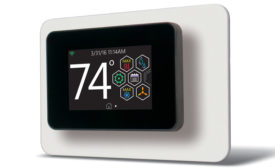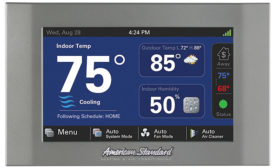Thermostats
EnergyHub can now manage the enrollment and dispatch of Nest’s Rush Hour Rewards
Read More
Over 80 Percent of Consumers Interested in Making Their Homes Smarter
To Americans, main benefits include increased convenience, increased security, reduced energy bill
May 3, 2016
TRC Announces 2016 Big Man On Planet Competition
HARDI wholesaler members compete to recycle the most mercury thermostats
April 29, 2016
Nest Expands Energy Business to More Than 50 Energy Providers
More than 30 percent of homes in U.S. now have access to Nest thermostat rebates and rewards
April 29, 2016
New Smart Thermostat Wins 2016 Red Dot Award for Product Design
Vivint Element thermostat is recognized in international design competition
April 14, 2016
ecobee and SunPower Launch Solar Plus Smart Thermostat Program
SunPower is offering ecobee owners a $500 mail-in rebate
April 1, 2016
ZigBee Smart Thermostat Market to Grow at 67% CAGR to 2020
Many residential users are seeking ways to reduce energy consumption and cut costs
March 29, 2016
Top Four Emerging Trends Impacting the Global Air Conditioning Market
Includes increased popularity of smart thermostats, rapid adoption of inverter air conditioners
March 28, 2016
Intelligent New Products in Home Automation
A sampling of the latest home automation products to hit the market
Read More
Copyright ©2024. All Rights Reserved BNP Media.
Design, CMS, Hosting & Web Development :: ePublishing


